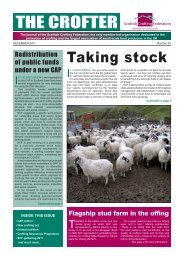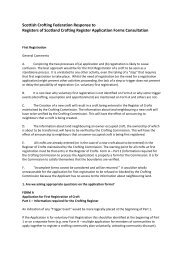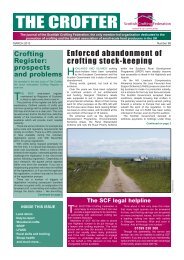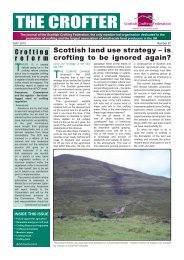Crofter 82 - Scottish Crofting Federation
Crofter 82 - Scottish Crofting Federation
Crofter 82 - Scottish Crofting Federation
You also want an ePaper? Increase the reach of your titles
YUMPU automatically turns print PDFs into web optimized ePapers that Google loves.
6<br />
LOCAL FOOD PRODUCTION<br />
THE CROFTER, MARCH 2009<br />
Adding to the quality of life<br />
llotments are now news. People<br />
are concerned about the cost of<br />
A food, health risks from herbicides<br />
and pesticides used in mass food production<br />
and the carbon footprint generated by the<br />
distribution systems of large supermarkets.<br />
Experiments like the Fife Diet Project,<br />
focussing on locally-sourced food, are proving<br />
surprisingly successful. But in many areas<br />
local suppliers and small shops have already<br />
been driven out of business by the fortnightly<br />
supermarket trip that has become the norm.<br />
So people who are not prepared to cut all<br />
non-local non-seasonal food from their menu,<br />
but would nevertheless like to take control<br />
of their diet, want to grow some of their own<br />
food. In a society where private gardens are<br />
shrinking the answer is – get an allotment.<br />
Who can have an allotment? In 2007, the<br />
<strong>Scottish</strong> Allotments and Gardens Society<br />
(SAGS) published the first ever audit of<br />
Scotland’s allotments: “Finding Scotland’s<br />
Allotments”. This showed where there are<br />
allotments and also where there are none. At<br />
the moment most allotments are concentrated<br />
in the big cities. Some local authority areas,<br />
for example the Western Isles, have none.<br />
The audit found roughly 6500 allotments and<br />
nearly 4000 people on waiting lists. 4000 may<br />
be the tip of an iceberg of demand as when<br />
people are told that there is a ten year waiting<br />
list they tend to give up.<br />
It is a myth that allotment gardening is a<br />
Availability of suitable land<br />
is a problem in rural areas as<br />
well as in towns and cities.<br />
solely urban phenomenon. Once every country<br />
stationmaster had a flower and vegetable<br />
plot on spare land provided by the railway<br />
company. Farm labourers and other rural<br />
workers frequently had access to land where<br />
they could grow food. Now these sources of<br />
land have disappeared under commercial<br />
pressure.<br />
SAGS is in touch with more than 60 groups<br />
in areas all over Scotland outside the big<br />
cities, who are trying to get land for allotments.<br />
However, since the recent publication by<br />
COSLA of guidance notes on allotments<br />
for <strong>Scottish</strong> Councils, rural councils from<br />
Shetland to the Borders are waking up to<br />
their obligations and to the advantages which<br />
allotment gardening can bring to individuals<br />
and communities.<br />
Availability of suitable land is a problem<br />
in rural areas as well as in towns and cities.<br />
However, a proactive council should examine<br />
its holdings to see if it has an area which<br />
can be used for allotments. The existence of<br />
allotments can add greatly to the quality of<br />
life of the local population. For the plotholder,<br />
allotment gardening provides a variety of<br />
benefits. As well as the basis for a healthy<br />
diet there is physical exercise, mental stress<br />
release and inclusive social interaction.<br />
Community groups such as eco-schools<br />
and mental health organisations have been<br />
welcomed onto many allotment sites and<br />
usually their pupils and clients love the time<br />
they spend on the allotment and benefit in<br />
all sorts of ways. Another myth – that the<br />
allotment gardener is a retired male whose<br />
main love in life is his prize leek – is thoroughly<br />
exploded. Allotment gardeners, male and<br />
female, come in a wide variety of ages, social<br />
and ethnic origins.<br />
Writing this amidst occasional snow flurries,<br />
it is satisfying to remember that it is possible<br />
to have some salad leaves available most of<br />
the year round. Leeks and parsnips can be<br />
left in the ground until required. Brassicas and<br />
spinach survive the worst of the weather. Our<br />
long summer days are ideally suited for soft<br />
fruits.<br />
SAGS is currently asking its members<br />
to record the time spent on the plot and the<br />
varieties and quantities harvested. Preliminary<br />
results show that even in cold Scotland it<br />
is possible to produce large quantities of<br />
courgettes, sweetcorn and mange tout peas<br />
outdoors – and with a greenhouse or cold<br />
frame you can have tomatoes, aubergines,<br />
melons …<br />
Producing one’s own food is not effortless.<br />
About 10 hours a week on the plot in summer<br />
seems to be ideal. But sowing, weeding, and<br />
harvesting are part of the pleasures. Little<br />
can beat the satisfaction of knowing that<br />
the delicious food you are eating has been<br />
produced by you, from a small seed that you<br />
stuck in the earth a few months ago.<br />
The <strong>Scottish</strong> Allotments and Gardens<br />
Society is a voluntary organisation, founded<br />
more than ninety years ago. Its aims are to<br />
protect, preserve, promote and campaign for<br />
allotments. Its management committee can<br />
help local groups on all aspects of allotments,<br />
from lobbying officials, basic facilities, to<br />
drawing up constitutions. Increasingly, SAGS<br />
has become involved in making the case for<br />
more allotments at national level. In the long<br />
term, it is looking forward to the time when the<br />
demand for plots is satisfied.<br />
Jenny Mollison and Barbara De La Rue of the<br />
<strong>Scottish</strong> Allotments and Gardens Society<br />
www.sags.org.uk










